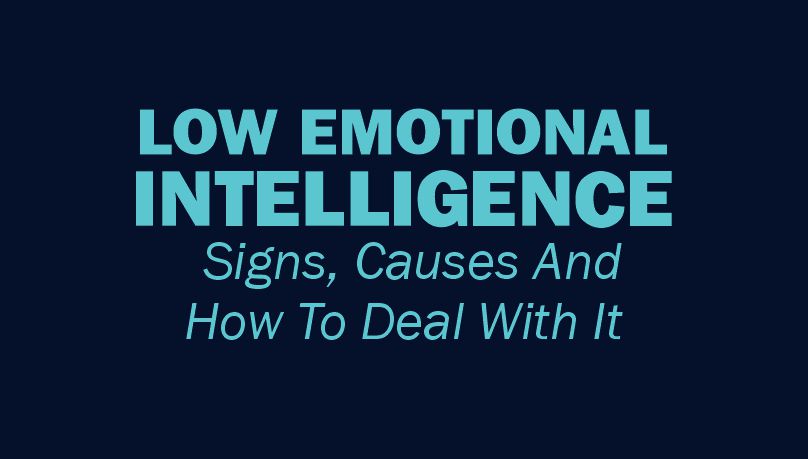Last updated on December 19th, 2023 at 04:33 am
Low emotional intelligence can hinder relationships and success. Learn the signs and how to cope with them and thrive in personal and professional settings.
Do you ever feel like you just can’t read the room? Like everyone else knows something you don’t, and you’re left feeling confused and out of place?
If so, you might be dealing with low emotional intelligence or low EQ.
Many experts now believe that emotional intelligence is more important than intelligence itself because it is needed in every facet of your life.
Lack of it automatically lands in the low EQ region where you struggle with communication and have strained relationships.
If you’re struggling with this problem, you might find yourself missing social cues, saying the wrong thing at the wrong time, or struggling to connect with others.
It can be frustrating and isolating, but the good news is that EQ is a skill that can be developed with practice and effort.
Table of Contents
- What is Low Emotional Intelligence/ Low EQ?
- Effects of Low EQ
- Signs of Low Emotional Intelligence
- Examples of Low Emotional Intelligence
- How to Deal with Someone with Low Emotional Intelligence
- How to Deal with a Spouse with Low Emotional Intelligence
- Examples of Leaders with Low Emotional Intelligence
- Overcoming Low EQ
- Conclusion
- Frequently Asked Questions
What is Low Emotional Intelligence/ Low EQ?

Low EQ is the inability to perceive, understand, or handle emotions in oneself and that of others.
It is a condition where you struggle to recognize, regulate, and express your emotions.
People with this issue may find it difficult to understand and manage their feelings and emotions.
It means you lack proper information to interact with yourself and others which is the core of existence.
It is characterised by a lack of empathy, poor social skills, and difficulty in understanding the emotions of others leading to misunderstandings and conflicts.
Related: Understanding Social Intelligence: A Guide to Navigating Social Situations

The causes of this problem are not fully understood.
However, it is believed that:
- Genetics
- Environment, and
- Upbringing
May all play a role.
Some experts suggest that a lack of emotional support during childhood can lead to low emotional intelligence in adulthood.
However, it could result also from medical conditions like alexithymia or autism. It could also be a result of mental health conditions.
Others believe that genetics may be a factor, as some people may be born with a predisposition to poor emotional intelligence.
However, it is important to note that having a medical condition does not necessarily mean that an individual has low emotional intelligence.
The good thing is that you can improve and do away with your low emotional intelligence and have, smooth and productive interactions with yourself, society, and nature at large.
Here is a comprehensive article on the causes of low emotional intelligence.
Related: 15 Phrases That Make You Emotionally Intelligent
Effects of Low EQ
If you have this problem, it can have a significant impact on your relationships, your workplace, and society as a whole.
In Personal Relationships
Lacking emotional intelligence can make it difficult for you to form and maintain healthy relationships.
You may struggle to understand and empathise with your partner’s feelings, which can lead to misunderstandings and conflict.
You may also struggle to regulate your own emotions, which can cause you to overreact or become defensive in arguments.
Additionally, it can make it challenging for you to build trust with others. You may struggle to recognise when you have hurt someone’s feelings, which can cause them to feel unsupported and unvalued.
This can lead to a breakdown in communication and ultimately damage your relationship.
Related: Why Emotional Intelligence is More Important than IQ
In the Workplace
Low EQ can also have a significant impact on your performance at work. You may struggle to work effectively in a team, as you may find it challenging to understand and respond appropriately to your colleagues’ emotions.
This can lead to misunderstandings and conflict, which can ultimately impact the productivity of the team.
Additionally, low emotional intelligence can make it difficult for you to manage your own emotions in the workplace.
You may struggle to regulate your emotions when faced with stressful situations, which can impact your ability to make sound decisions and perform at your best.
Finally, being low in emotional intelligence can impact your ability to communicate effectively with your colleagues and managers.
You may struggle to recognize the emotional needs of others, which can lead to misunderstandings and a communication breakdown.
In Society
Lack of emotional intelligence can also have a broader impact on society as a whole. Individuals with the problem may struggle to understand and empathise with the emotions of others, which can lead to a lack of compassion and understanding in society.
Additionally, a lack of EQ can impact the way individuals interact with others from different backgrounds and cultures.
Also Read: 10 Powerful Emotions Used in Persuasion
Signs of Low Emotional Intelligence

1. Difficulty Understanding and Managing Your Emotions
A person with low EQ may struggle to identify and understand their own emotions.
They may find it challenging to express their feelings appropriately or regulate their emotional responses.
2. Lack of Empathy
Empathy is the ability to understand and share another person’s emotions.
People with low EQ may find it difficult to connect with and understand others’ feelings, leading to a lack of empathy.
They may struggle to put themselves in someone else’s shoes or fail to recognize the impact of their actions on others.
3. Poor Social Skills
Low EQ can manifest as a lack of social skills. Individuals may struggle with maintaining relationships, communication, and cooperation with others.
They may have a hard time resolving conflicts or understanding social cues, leading to difficulties in social gatherings or work environments.
4. Inability to Handle Stress and Pressure
Individuals with low EQ may find it challenging to cope with stress, pressure, or difficult situations.
They may become easily overwhelmed, have difficulty problem-solving, and struggle to manage their emotions in high-stress environments.
Related: What is Self-Awareness?
5. Difficulty Adapting to Change
Low EQ can hinder one’s ability to adapt to change.
People with low emotional intelligence may feel uncomfortable with unfamiliar situations and struggle to adjust their thoughts and behaviors accordingly.
They may resist change or become anxious and stressed when faced with new experiences or challenges.
6. Lack of Self-awareness
Self-awareness is the ability to recognize and understand one’s own emotions, thoughts, and behaviors.
Those with poor emotional perception often lack self-awareness and may not recognize how their emotions, actions, or words impact others.
They may also have difficulty identifying and addressing their strengths, weaknesses, and areas for personal growth.
7. Impulsivity and Emotional Reactivity
People with limited emotional awareness may be more prone to impulsive behavior and emotional reactivity.
They may react quickly and intensely to situations without considering the consequences, which can lead to poor decision-making or conflict in relationships.
Related: How To Become A Smart Person Everyday
Examples of Low Emotional Intelligence

Here are a few example scenarios that might illustrate low EQ:
- A person who frequently loses their temper over minor inconveniences, causing strain in their personal and professional relationships.
- Someone who struggles to understand how their words and actions impact others, often unintentionally causing hurt feelings or misunderstandings.
- An individual who has difficulty coping with stress and often resorts to unhealthy behaviours or coping mechanisms, such as excessive drinking or emotional eating.
- A person who is unable to empathize with others and tends to dismiss or invalidate the feelings and experiences of those around them.
ALSO READ: Why Multitasking is Dangerous
How to Deal with Someone with Low Emotional Intelligence
You might want to be rude to cut them off, but then you are the one with high emotional intelligence traits.
Dealing with someone with low EQ can be challenging, but several strategies can help:
Remain Calm: It is important to stay calm and composed when interacting with someone who has low EQ. Reacting emotionally or becoming defensive may escalate the situation further.
Empathy and Understanding: Try to understand that individuals deficient in empathy skills may struggle to recognize and express their emotions. Put yourself in their shoes and try to see things from their perspective. This can help you respond with empathy and patience.
Clear Communication: Keep your communication clear, concise, and straightforward. Avoid using sarcasm or complex language that could be misunderstood. Be explicit about your feelings or expectations to minimize potential misinterpretations.
Active Listening: Practice active listening by fully engaging in the conversation and demonstrating that you understand what the other person is saying. This can help create a more positive and productive dialogue.
Provide Feedback: Share feedback in a constructive and non-confrontational manner. Provide specific examples of how their behaviour or communication style impacts you or others. This can help them understand their effect on others and recognize areas for improvement.
Establish Personal Boundaries: Establish personal boundaries and communicate them. Individuals with low EQ may struggle to recognize social cues or boundaries, so setting explicit guidelines can help maintain a healthy relationship.
Seek Common Ground: Look for common interests or goals that you share, as this can help in building rapport and finding areas of agreement. Finding common ground can also help navigate difficult conversations more effectively.
Practice Emotional Regulation: Model healthy emotional regulation by managing your own emotions effectively. This can help the other person understand and learn from your example.
Seek Support: Dealing with someone with underdeveloped emotional insight can be draining, so it is essential to seek support from friends, family, or professionals if necessary. They can provide guidance, perspective, and emotional support during challenging interactions.
Related: The importance of improving self-awareness
How to Deal with a Spouse with Low Emotional Intelligence
Dealing with a spouse who has low EQ can be challenging, but there are ways to navigate the situation. Here’s a step-by-step approach:
- Recognize that your spouse may have difficulty in these areas and that it can affect your relationship dynamics.
- Be patient and understanding and communicate with them openly, allowing them to express themselves without judgment or criticism. Encourage open dialogue to help them recognize their emotional responses.
- Offer your spouse information about emotional intelligence, its benefits, and how it can improve relationships. Suggest books, articles, or online resources that they can explore to gain a better understanding. This educational approach can help them develop self-awareness and offer new insights.
- Lead by example and show empathy, emotional awareness, and effective communication skills in your actions and words. Model the behaviour you want to see in your spouse, as they may learn from your example.
- If the struggles with emotional intelligence persist or significantly impact your relationship, consider suggesting professional help. A therapist or counselor can provide guidance and support for both of you in navigating emotional challenges.
- Practice patience and understanding: Remember that improving emotional intelligence is a gradual process, and change may not happen overnight. Patience, understanding, and support are essential during this journey. Celebrate small successes and encourage along the way.
- Be supportive and create an environment that encourages emotional expression and growth. Encourage a safe and non-judgmental space where both of you can openly talk about feelings, concerns, and emotions. Encourage your spouse to express themselves without fear of criticism or negativity.
Examples of Leaders with Low Emotional Intelligence
Steve Jobs: While he was highly regarded for his visionary leadership and innovation at Apple, Jobs was notorious for his temper, lack of empathy towards employees, and inability to handle criticism. He also had a reputation for being demanding and controlling, which often led to strained relationships and conflicts within the company.
Richard Nixon: As the 37th President of the United States, Nixon showed low EQ during the Watergate scandal. He displayed a lack of self-awareness, an inability to empathize with the public’s concerns, and a tendency to ignore advice from his advisors. These emotional shortcomings ultimately led to his resignation from office.
Marissa Mayer: During her tenure as CEO of Yahoo, Mayer was criticized for her autocratic leadership style and lack of emotional intelligence. She often made decisions without considering the opinions or concerns of her employees, leading to a decline in morale and employee engagement within the company.
Bobby Knight: Knight, a renowned college basketball coach, was known for his explosive temper and aggressive behavior towards players, referees, and the media. His lack of emotional intelligence was evident in his inability to manage his anger effectively, which resulted in numerous incidents of verbal and physical abuse.
Tony Hayward: As the CEO of British Petroleum (BP) during the Deepwater Horizon oil spill in 2010, Hayward demonstrated low emotional intelligence. His dismissive and insensitive comments regarding the environmental and economic impact of the crisis showcased a lack of empathy and understanding for the severity of the situation, further damaging BP’s reputation.
Related: Social Intelligence Test: What Is Social Intelligence?
Overcoming Low EQ
If you struggle with this problem, don’t worry – there are steps you can take to improve it.
By focusing on specific areas, you can increase your self-awareness, self-regulation, motivation, empathy, and social skills.
Here are some tips:
Self-Awareness
- Reflect on your emotions and reactions to situations
- Ask for feedback from others to gain a different perspective
- Keep a journal to track your emotions and triggers
Self-Regulation
- Practice mindfulness and meditation to help control your emotions
- Pause before reacting to a situation
- Set boundaries for yourself and others
Motivation
- Set achievable goals for yourself
- Find purpose and meaning in your work and personal life
- Focus on the positive outcomes of a situation
Empathy
- Practice active listening to understand others’ perspectives
- Put yourself in others’ shoes to gain empathy
- Validate others’ emotions and experiences
Social Skills
- Practice effective communication, both verbal and nonverbal
- Collaborate with others and work towards common goals
- Develop a sense of humour and learn to laugh at yourself
Conclusion
So, there you have it – a crash course in low EQ. Hopefully, you’ve learned a thing or two about the importance of emotional intelligence and how to spot when someone is lacking in this area.
Remember, having this problem doesn’t make you a bad person – it just means you may struggle in certain areas of life. The good news is that emotional intelligence can be improved with practice and effort.
If you recognise any of the signs of low EQ in yourself, don’t despair. There are plenty of resources available to help you improve your emotional intelligence and become a more well-rounded individual.
Frequently Asked Questions
What is low emotional intelligence?
It refers to a person’s inability to recognise, understand, and manage their own emotions and the emotions of others. People with low emotional intelligence may struggle to connect with others, manage stress, and communicate effectively.
What causes low emotional intelligence?
There is no one specific cause of low EQ. It can be due to a variety of factors, including genetics, upbringing, and life experiences. Some people may simply have a harder time with emotional intelligence than others.
Can you improve your emotional intelligence?
Yes, you can improve your emotional intelligence with practice and effort. This can include taking courses or workshops, working with a therapist, and practicing mindfulness and other self-awareness techniques.
What are some signs of low emotional intelligence?
Some signs include difficulty in managing emotions, poor communication skills, lack of empathy, and difficulty in building and maintaining relationships.
Can low emotional intelligence be a barrier to success?
Yes, it can be a barrier to success. People with low emotional intelligence may struggle to work well with others, manage stress, and communicate effectively, all of which can impact their ability to succeed in both personal and professional settings.
REFERENCE:
Signs Of Low Emotional Intelligence
How to Spot a Person With Low Emotional Quotient
12 Signs of Low Emotional Intelligence and How to Handle It
Dealing With Low Emotional Intelligence
Pious Clements is the insightful voice behind "The Conducts of Life" blog, where he writes about life ethics, self-development, life mastery, and the dynamics of people and society.
With a profound understanding of human behaviuor and societal dynamics, Pious offers thought-provoking perspectives on ethical living and personal growth.
Through engaging narratives and astute observations, he inspires readers to navigate life's complexities with wisdom and integrity, encouraging a deeper understanding of the human experience and our place within society.

